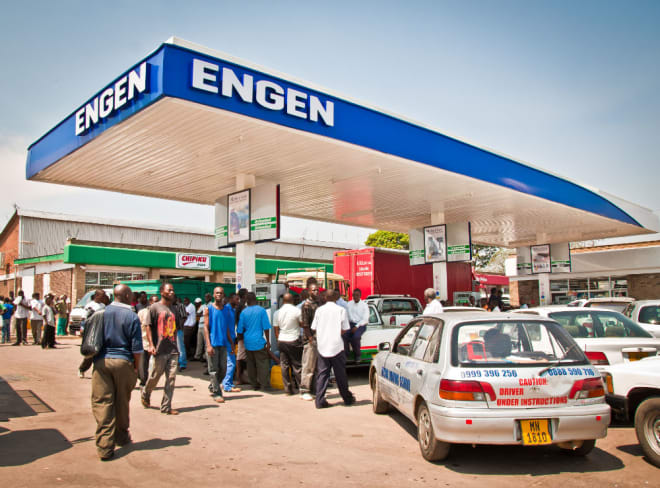Fuel Scarcity Fuels Corruption in Malawi

Amidst severe fuel scarcities, frustrated drivers queue at a gas station after being tipped off that a tanker is set to arrive to offload petrol. Photo: Elena Sosa Lerín
It’s a Thursday afternoon, and the thermometer is about to hit 40 degrees.
Taxi driver Mike Msindira, 32, is sweaty and exasperated but resigned to the idea of losing time and his daily income of C$75 by driving all over Blantyre looking for fuel.
He has now been at this gas station for nearly nine hours. His tank is at zero. Still, he won’t leave. His car is one of the first vehicles in the queue, and he’s heard from different sources that this particular gas station will be receiving gasoline and diesel before the end of the day.
Msindira, along with thousands of other Malawians, is experiencing the fourth fuel crisis of the year.
Each crisis has been the result of the government’s failure to import gasoline or diesel due to its inability to acquire foreign exchange.
Fuel scarcity in the country has disrupted businesses, affected public services, and even regular activities, such as going to work or driving children to school.
But those who don’t own a car are also hurting.
Due to fuel scarcity, by the end of November, minibus operators announced a significant increase in their bus fares, from an average of 50 cents to around 70 cents per journey.
Considering that most Malawians live on less than two dollars a day, many have chosen to walk to and from their workplaces and homes, as they cannot afford to pay the new rates.
But the one thing that the absence of fuel has been fuelling is corruption.
For instance, Msindira says that it’s becoming an unfair but standard practice to pay “tips” to gas station attendants to get advanced notice of the day and time the station is set to receive petrol.
If you don’t tip them, Msindira says, you don’t get serviced at all.
The Malawi Energy Regulating Authority has stated that it will revoke the licenses of operators who engage in corruption. It also says that it will work with the police to arrest those attendants who ask for tips. However, to date, nothing has been mentioned as to how these measures will be implemented.
These crises have seen the emergence of a steady black market for the illegal sale of fuel, with prices ranging from $5 to $6 per litre.
Adding insult to injury, unscrupulous traders are mixing fuel with other substances, such as paraffin or water, potentially harming car engines.
Blessings Nkhambure, 27, an electrical engineer, has waited for 48 hours to get gasoline.
“I’m stinky!” he says, showing large, dark sweat stains under his armpits.
He hasn’t showered for two days. His meals have consisted of bananas or bread, which he passes down with Fanta. To avoid falling asleep at the gas station at night, he chats with the people around him or listens to music from his cell phone.
“The government should assist us urgently,” Nkhambure says. “We can’t run our business, we can’t eat, we can’t do anything without fuel.”
In an attempt to appease the public, the government announced in late October that the Reserve Bank of Malawi had made over $3 million available to Petroleum Importers Limited (PIL) to allow the purchase of 15 million litres of fuel.
But this only provided Malawians with 20 days-worth of petrol, and fuel scarcity reared its ugly head once more.
Energy Minister Goodall Gondwe admitted that this effort wasn’t enough in early November, explaining that roughly $30 million is needed to solve the issue.
► A version of this story was originally published on December 2016 in The Toronto Star's 'Africa without Maps' blog.
Follow me on Twitter: @e_sarin. Email me your thoughts, suggestions, or critiques at: elenasosalerin@gmail.com.